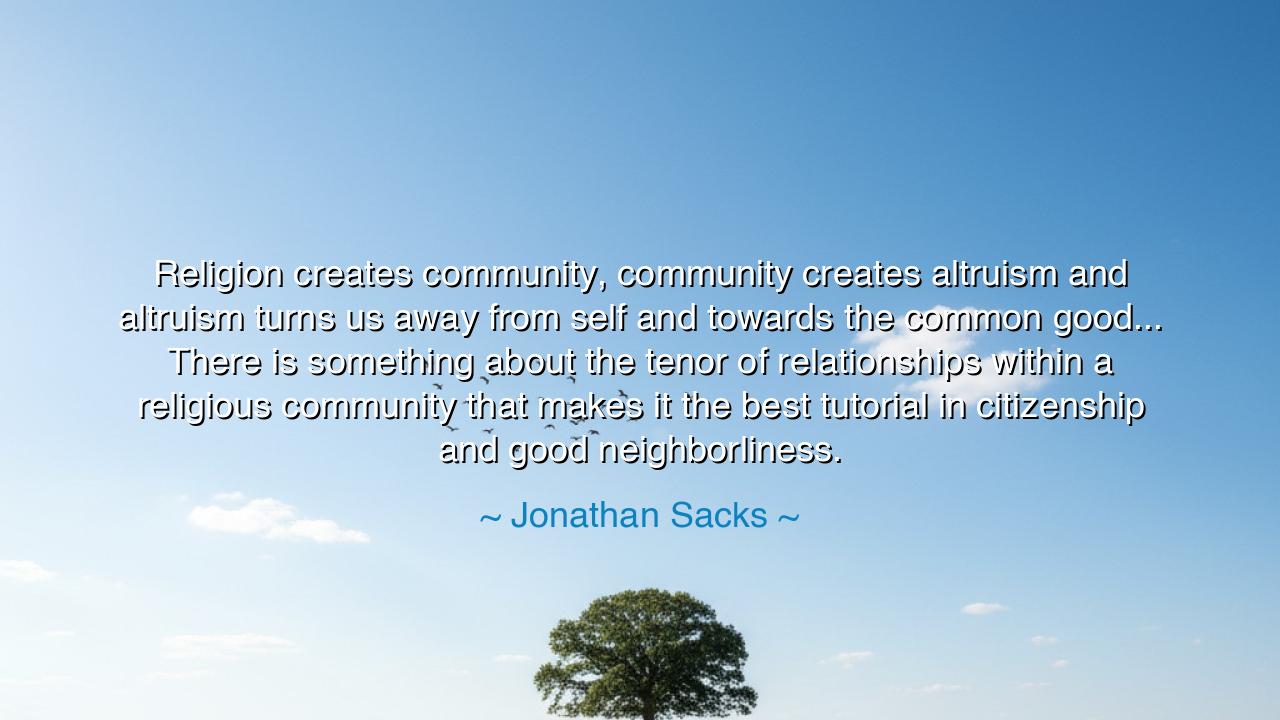
Religion creates community, community creates altruism and
Religion creates community, community creates altruism and altruism turns us away from self and towards the common good... There is something about the tenor of relationships within a religious community that makes it the best tutorial in citizenship and good neighborliness.






Hear, O children of fellowship and unity, the noble words of Jonathan Sacks, sage and teacher of nations: “Religion creates community, community creates altruism and altruism turns us away from self and towards the common good... There is something about the tenor of relationships within a religious community that makes it the best tutorial in citizenship and good neighborliness.” In these words lies a chain of wisdom, each link forged from the deepest truths of human life. Faith awakens community, community awakens altruism, and altruism awakens the soul to the common good. Thus the circle of life is completed: what begins in worship leads to justice, and what begins in reverence leads to harmony among neighbors.
The origin of this saying is found in Sacks’ role as Chief Rabbi of the United Kingdom, where he reflected deeply on the place of religion in modern society. In an age when many believed faith was fading, Sacks observed that it continued to provide something irreplaceable: a school of belonging. Religion, he argued, is not merely about doctrines or rituals; it is about binding people together into communities of care, where the self is dethroned and the other is embraced. From this sacred togetherness arises the virtue of altruism, which teaches men and women to give, to sacrifice, and to live not only for themselves but for the whole.
The ancients, too, bore witness to this truth. In Greece, the polis thrived not because of isolated individuals, but because of shared festivals and sacred rituals that bound citizens together. In Israel, the Law of Moses commanded not only worship of God but care for the widow, the orphan, and the stranger—reminding the people that true faith was inseparable from neighborliness. In the Christian church of the first century, believers sold their possessions and shared them so that none among them would go hungry. Always, religion at its purest forged communities of giving.
History provides luminous examples. Consider the work of the Quakers in England and America, who, bound together by religious conviction, championed the abolition of slavery, education for the poor, and fair treatment of workers. Their gatherings were not just prayers to God but commitments to one another and to society. Or reflect upon the civil rights movement in the United States, born in Black churches where hymns became anthems of courage and pulpits became platforms for justice. In both cases, it was religious community that gave birth to altruism and shaped citizens who labored for the common good.
The meaning of Sacks’ words is therefore both simple and profound: religion is not only about the divine; it is about the human. It teaches us to move beyond isolation, to leave behind selfishness, and to discover our place in a greater whole. In the embrace of a religious community, the lonely find family, the selfish learn sacrifice, and the timid learn courage. Such communities are schools of the heart, where love is practiced daily and citizenship is born in acts of kindness.
The lesson for us, O listeners, is urgent in an age of fragmentation: do not despise the power of community. Whether you are religious or not, know that belonging to something greater than yourself will awaken virtues you cannot learn alone. The world does not thrive when each pursues only his own gain; it flourishes when people bind themselves to shared values, shared duties, and shared hopes. Religion, in its highest form, is not about separation but about the weaving of lives into a common fabric of compassion.
Practical actions stand before you: If you belong to a religious community, cherish it not only as a place of prayer but as a training ground for generosity. Give your time, your talents, your love to strengthen those around you. If you do not belong to one, still seek ways to live in community—join groups of service, of learning, of shared purpose—for the principle holds true beyond creed. Above all, strive each day to turn from self toward the common good, for in that turning lies the fulfillment of life.
Thus, remember the teaching of Jonathan Sacks: religion creates community, community creates altruism, and altruism creates the common good. Hold this chain of wisdom as a guide. For in learning to love within community, we learn to love the world. And when neighbors live as brothers, and communities live as families, then nations will rise in peace, and humanity will find its true strength.






AAdministratorAdministrator
Welcome, honored guests. Please leave a comment, we will respond soon